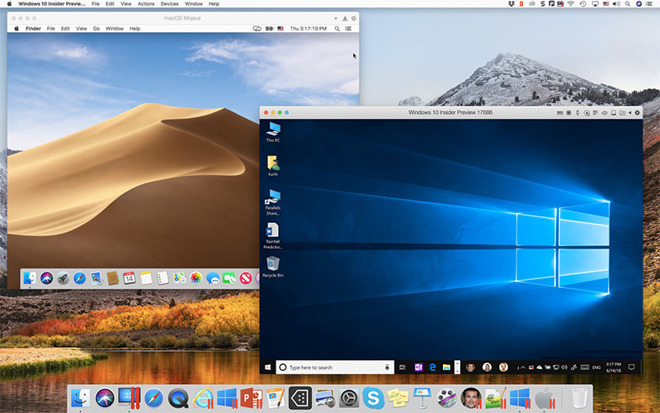Corel, recent buyer of virtualization software firm Parallels, acquired by private equity ...
Longtime software maker Corel, which in December purchased popular cross-platform virtualization software maker Parallels, was itself recently acquired by private equity firm KKR, according to a report Tuesday.

Parallels became a subsidiary or Corel in December.
Citing sources familiar with the matter, TechCrunch reports a memo to Corel staff confirms the sale to KKR, which was first rumored in May. At the time, PE Hub claimed KKR was in negotiations to buy Corel from Vector Capital, a PE firm whose stake in Corel has fluctuated since 2003, as part of a deal worth over $1 billion.
According to the memo, KKR is "very optimistic" about Corel and will grant the company an "infusion of capital" to expand its current business, the TechCrunch report said. The investment will also go toward new acquisitions like the Parallels buy accomplished in December.
Corel is a storied Canadian software company with a number of well established titles under its belt including CorelDRAW, WordPerfect and WinZip. While its flagship products have largely been usurped by offerings from competitors Microsoft and Adobe, the company continues to market its core line as it branches out with more modern solutions like CorelCAD.
As for Parallels, the acquisition last year was the latest in a long line of industry moves to build out Corel's stable of subsidiaries. The Canadian company has collected a number of notable software standouts since its founding in 1985, from developers like Bibble and JASC Software to products like WordPerfect.
That trend should continue under KKR if the memo is accurate.
More recently, Corel has deviated from a concentration on creative and productivity applications to properties better suited to serve the needs of contemporary computer users. As noted by TechCrunch, Corel's recent acquisitions demonstrate a shift in focus toward e-commerce, subscriptions and other areas.
Parallels develops a virtualization toolset that presents users a cohesive work environment across multiple platforms including Mac, Windows, iOS, Android and more.

Parallels became a subsidiary or Corel in December.
Citing sources familiar with the matter, TechCrunch reports a memo to Corel staff confirms the sale to KKR, which was first rumored in May. At the time, PE Hub claimed KKR was in negotiations to buy Corel from Vector Capital, a PE firm whose stake in Corel has fluctuated since 2003, as part of a deal worth over $1 billion.
According to the memo, KKR is "very optimistic" about Corel and will grant the company an "infusion of capital" to expand its current business, the TechCrunch report said. The investment will also go toward new acquisitions like the Parallels buy accomplished in December.
Corel is a storied Canadian software company with a number of well established titles under its belt including CorelDRAW, WordPerfect and WinZip. While its flagship products have largely been usurped by offerings from competitors Microsoft and Adobe, the company continues to market its core line as it branches out with more modern solutions like CorelCAD.
As for Parallels, the acquisition last year was the latest in a long line of industry moves to build out Corel's stable of subsidiaries. The Canadian company has collected a number of notable software standouts since its founding in 1985, from developers like Bibble and JASC Software to products like WordPerfect.
That trend should continue under KKR if the memo is accurate.
More recently, Corel has deviated from a concentration on creative and productivity applications to properties better suited to serve the needs of contemporary computer users. As noted by TechCrunch, Corel's recent acquisitions demonstrate a shift in focus toward e-commerce, subscriptions and other areas.
Parallels develops a virtualization toolset that presents users a cohesive work environment across multiple platforms including Mac, Windows, iOS, Android and more.

Comments
A few years later, with 2-3 Macs I use regularly, I tried Fusion 7 because VMWare has a much more liberal license policy (that is, one license can be installed on up to three Macs, while Parallels requires a license for each, even when only one is in use at a time). I hated how it treats multiple displays - when using multiple displays on a guest, it does not allow you to switch those displays independently. I frequently will have one display showing a guest OS while the other displays my host OS windows and I switch back and forth. Parallels allows this. Fusion does not. If you swipe one display’s space, the other display switches as well. This is a show stopper and is not even a selectable option. From what I can tell, this still exists in current versions of Fusion.
For this reason alone I pay for two Parallels licenses rather than a single Fusion license.
"There's always a bigger fish" - Qui-Gon Jinn.
It's what most of these folks in this space do... if you have the capital it's far easier than doing something additive/productive to earn crazy returns.
(Disclosure: I've worked for a KKR owned firm).
Too bad the corporation could never get their shit together. good night, sweet prince
Live and let Live. Or Live and let Die. But both these expressions share the word "let".